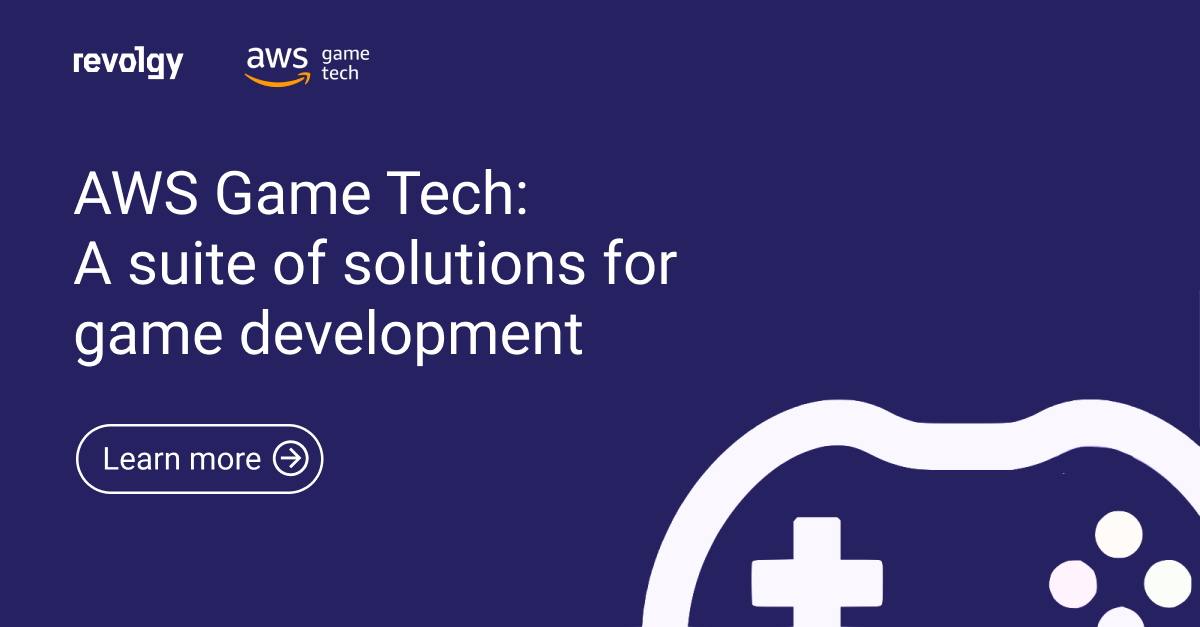AWS, Gaming
Using AWS for real-time player data analysis in game development
In multiplayer gaming, keeping players engaged isn’t just about great graphics or fun gameplay — it’s about reacting to what players are doing in real-time. From tweaking matchmaking to adjusting difficulty, live player data is becoming a critical tool in modern game development.
I spoke with Charlie Olson, co-founder of Invokation Games, about how they leverage AWS to analyze player data. At Revolgy, we know that building responsive systems is key to player retention, and Charlie’s insights gave us a closer look at how AWS helps them do just that.
Why is real-time player data important
Games today aren’t static experiences. Developers need to constantly adapt to what’s happening in the game, especially in multiplayer settings. Real-time data helps developers see how players are interacting with the game and allow for quick adjustments that keep things balanced and fun.
Charlie explained how important it is to use this data effectively: “By analyzing player data in real-time, we can make adjustments to matchmaking that keep games fair and fun.” Whether tweaking the difficulty level, adjusting player rankings, or even changing match rules based on performance, live data is important for keeping the game engaging.
For example, when player performance fluctuates — they might have good days and bad days — real-time data can help matchmaking systems adapt. This keeps players from feeling frustrated or overwhelmed, so they continue enjoying the game.
The role of AWS in real-time player data
AWS provides game developers with the tools they need to analyze and respond to player data quickly. Charlie shared how Invokation Games uses AWS to handle massive amounts of live data without needing to build complicated infrastructure.
Let’s take AWS Lambda first. In gaming, Lambda is useful for processing real-time events and adjusting to player activity without any extra effort. It automatically runs code when something happens, like a player finishing a match or new data coming in. There’s no need to manage servers, it scales up on its own, and it’s cost-effective since it only charges for the time the code is actually running.
Amazon Kinesis, another AWS service, handles instant data streams. It helps collect and process player actions as they happen, so developers can quickly react to in-game events, adjust matchmaking, or monitor player performance.
Listen to the talk with Charlie from Invokation Games here.
While Lambda and Kinesis handle real-time data during gameplay, AWS also offers services like DynamoDB and RDS to keep everything organized and running smoothly behind the scenes. Amazon DynamoDB, for example, is a fast and flexible NoSQL database that stores data like player profiles, game progress, or leaderboards. It has a low-latency performance so that data can be quickly retrieved and updated.
For more structured data, there is also Amazon RDS (Relational Database Service), which is a fully managed service that handles relational databases. RDS is great for storing match histories or ranking systems, and it makes sure that large volumes of data can be accessed and queried efficiently.
Improving player retention through data
One of the biggest benefits of using real-time data is improving player retention. By responding to what’s happening in the game, developers can keep players engaged for longer periods. If players feel like the game is too hard or too easy, they might quit. But by using data to make adjustments, developers can prevent this.
Charlie highlighted this point, saying that “real-time data helps us see when players might be losing interest, so we can adjust the game to keep them engaged.” This could mean adjusting the matchmaking, tweaking the game’s difficulty, or even offering in-game rewards at just the right moment to keep players motivated.
With AWS, developers can quickly scale their games without worrying about server limits. They can handle more players and process the data needed to keep players engaged.
Fine-tuning playtesting with Remāngu’s real-time feedback
Beyond live gameplay, data also plays a key role during game development. This is where Remāngu steps in, helping developers streamline their playtesting process. By providing real-time feedback from testers as they play, Remāngu allows developers to make immediate adjustments to gameplay, spot bugs, and fine-tune game balance much faster.
With Remāngu’s instant feedback loop, developers can tweak the game on the go, ensuring it’s balanced and ready before launch. Whether it’s replicating specific in-game scenarios or scaling playtests for larger groups, the platform helps gather valuable insights into how players interact with the game.
When combined with AWS services during live gameplay, Remāngu helps developers cover both ends — smooth playtesting and delivering a polished, engaging experience once the game goes live.
AWS provides game developers with the means to respond instantly to player actions through services like Lambda, DynamoDB, and Kinesis. Meanwhile, Remāngu enhances the development process with live feedback during playtesting, helping developers fine-tune their games before launch. With AWS and Remāngu, which runs on AWS, developers have everything they need — from early testing to live gameplay — to maintain player interest, boost retention, and create an unforgettable gaming experience.
Read success story: Rabbit’s Foot Studios’ success with Remāngu & AWS




